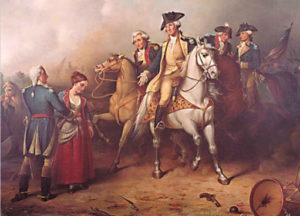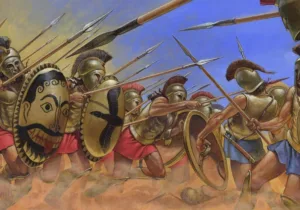Mary Ludwig Hays, was rough, uneducated, illiterate, and cursed like a sailor. And, historians say—if more despite than because—she was universally liked, even adored, by those who knew her. For much of her later years she squeaked through a living as a servant for hire, performing menial tasks, cooking meals, washing and cleaning, and, always, caring for children and the sick. Continental army records show that her husband, William Hays, a barber, was an artilleryman at the Battle of Monmouth, in Maryland, in 1778. For her part, Molly is not officially recorded as having participated in any fight. But she was at Monmouth. She became a hero there.
Mary Hays is better known as Molly Pitcher. Her military service begins, if unofficially, at Valley Forge, Pennsylvania in 1777, where she followed her husband’s regiment as it made its winter camp. There, led by Martha Washington, Mary was a part of the camp followers, a group of wives and other women, who cared for the soldiers by washing clothes, cooking, and succoring the ill. In the spring, as her husband trained as an artilleryman, Molly and other camp followers continued to serve as water-bearers, bringing water to the drilling servicemen, but also to cool down the cannon barrels and to soak the sponge on the rammers—the devices used to scrub the cannon clean of sparks. It is here that Mary—who often went by Molly—likely picked up the additional nickname Pitcher—as troops in need of water would shout, “Molly! Pitcher!”
At the Battle of Monmouth, 239 years ago this week, Molly maintained her role as water-bearer. In weather topping 100 degrees, and under heavy and sustained enemy fire, she continuously carried crucial water supplies to the heat-exhausted men and overheating cannons, and tended the injured. In the course of the battle, Molly’s husband was himself wounded, and knocked out of the battle. Stepping in, Molly gamely took over. For the duration of the fight she continued to swab and load the weapon.
At one point, Molly had her own near-brush with disaster. Another American soldier recorded the moment in his memoirs:
A woman whose husband belonged to the artillery and who was then attached to a piece in the engagement, attended with her husband at the piece the whole time. While in the act of reaching for a cartridge and having one of her feet as far before the other as she could step, a cannon shot from the enemy passed directly between her legs without doing any other damage than carrying away all the lower part of her petticoat. Looking at it with apparent unconcern, she observed that it was lucky it did not pass a little higher, for in that case ‘it might have carried away something else,’ and continued her occupation.
Late in the day, the fighting would eventually discontinue due to the failing light. By the next morning, it was discovered the British had  disengaged during the night and retreated toward New Jersey. Molly’s fight was over, but she had attracted the attention of Gen. George Washington. After the battle, he inquired about the woman he had seen on a canon crew. So impressed by her courage, Washington personally thanked the power-stained warrior and issued her a warrant as a non-commissioned officer. Thereafter, in addition to Pitcher, she would also be known as Sergeant Molly. Toward the end of her life, the Commonwealth of Pennsylvania awarded her a pension to sustain her in her final years. She died, 195 years ago this year. She is buried in the Old Cemetery at Carlisle.
disengaged during the night and retreated toward New Jersey. Molly’s fight was over, but she had attracted the attention of Gen. George Washington. After the battle, he inquired about the woman he had seen on a canon crew. So impressed by her courage, Washington personally thanked the power-stained warrior and issued her a warrant as a non-commissioned officer. Thereafter, in addition to Pitcher, she would also be known as Sergeant Molly. Toward the end of her life, the Commonwealth of Pennsylvania awarded her a pension to sustain her in her final years. She died, 195 years ago this year. She is buried in the Old Cemetery at Carlisle.
In these pages, I’ve detailed my opposition to women being deployed in direct combat roles, as have others—including Jennifer Marshall and Debra Erickson. Nevertheless, such a stance in no way desires to detract from the extraordinary courage and capability women have shown in the defense of this nation, from its very beginning to the present day. In moments of real crisis, it’s all-hands-on-deck and, in other moments, as Molly Pitcher proves, the fluidity of battle lines and circumstances can sometimes suck everyone into the deadly tide of combat. For such reasons, women in uniform should be availed whatever level of training they’re capable of enduring–and the respect and honor that so follows.
As our nation’s birthday draws near, I stand with a grateful land and applaud all those—men and women alike—who have stood on freedom’s wall in the cause of liberty.
—
Marc LiVecche is managing editor at Providence






